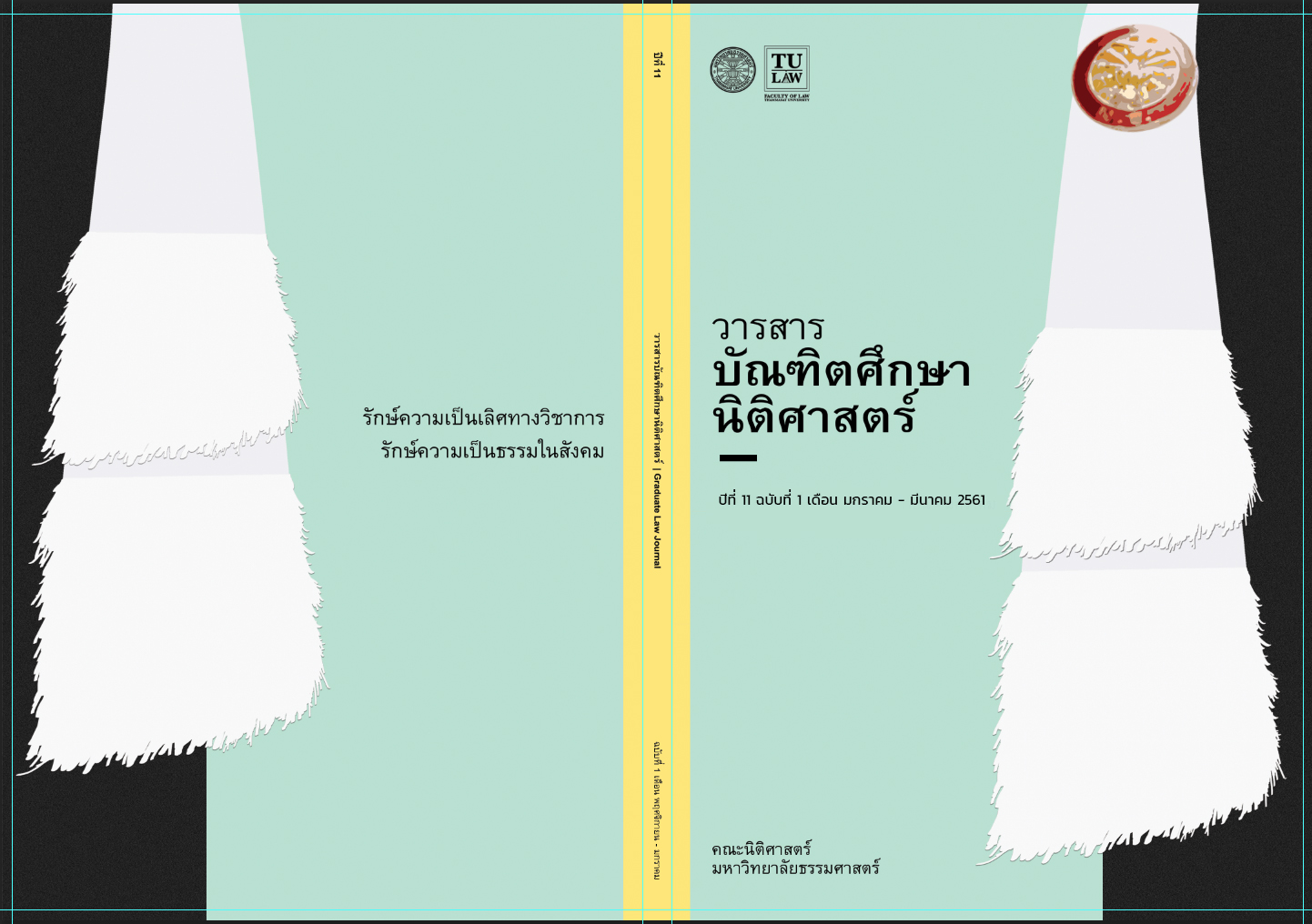LEGAL MEASURES TO PROMOTE ELECTRIC VEHICLES IN THAILAND
Keywords:
Electric Vehicles, EVs, Promotes and legal, ThailandAbstract
Currently, most of the vehicles in Thailand are powered by combustion engines fueled by gasoline which cause environmental pollutions. To reduce the pollutions, electric vehicles using rechargeable batteries with nearly zero emission should be promoted. The study reveals that even there are some policies and legal measures which support the usage of electric vehicles, Thai government still needs to adopt more appropriate policies and legal measures to help expand the use of electric vehicles.
References
เอกลักษณ์ วิลัยหงส์.”มาตรการทางกฎหมายภาษีสรรพสามิตและภาษีศุลกากรเพื่อส่งเสริม การใช้รถยนต์ไฟฟ้าของประเทศไทย.” วิทยานิพนธ์มหาบัณฑิต คณะนิติศาสตร์ปรีดี พนมยงค์ มหาวิทยาลัยธุรกิจบัณฑิตย์, 2558.
เว็บไซต์
กรมพัฒนาพลังงานทดแทนและอนุรักษ์พลังงาน. “สถานการณ์พลังงานของประเทศไทย มกราคม – ธันวาคม2558.” http://www.dede.go.th/ download/vstate_59/frontpage dec2558.pdf, 27 สิงหาคม 2559
ณิชชา บูรณสิงห์.“รถยนต์พลังงานไฟฟ้านวัตกรรมใหม่เพื่อสิ่งแวดล้อม.” http://library2. parliament.go.th/ebook/content-issue/2558/hi2558-093.pdf, 27 กรกฎาคม 2559
มหาวิทยาลัยเทคโนโลยีพระจอมเกล้าธนบุรี (มจธ.) และศูนย์เทคโนโลยีโลหะและวัสดุแห่งชาติ (MTEC). “การศึกษาการพัฒนาของเทคโนโลยียานยนต์ไฟฟ้าและผลกระทบที่เกิดขึ้นสาหรับประเทศไทย (ฉบับปรับปรุง 8 กุมภาพันธ์ 2558).” http://energyforum.kmutt.ac.th/download/รายงานฉบับสมบูรณ์โครงการยานยนต์ไฟฟ้า.pdf, 29 กรกฎาคม 2559
สำนักงานนโยบายและแผนพลังงาน.“โครงการศึกษาการเตรียมความพร้อมรองรับการใช้ยานพาหนะไฟฟ้าในอนาคตสำหรับประเทศไทย รายงานฉบับสมบูรณ์ (ฉบับปรับปรุง), http://www.eppo.go.th/index.php/th/eppo-intranet/item/7587-stu-re001, 29 กรกฎาคม 2559
สำนักงานเลขาธิการสภาผู้แทนราษฎร. “พลังงานสะอาด ทางเลือกใหม่คนไทย.”http://library2.parliament.go.th/ejournal/content_af/2558/jan2558-3.pdf, 11 กันยายน 2559
อรรถสิทธิ์ แจ่มฟ้า.”รถยนต์ไฟฟ้ากับการเปลี่ยนแปลงของอุตสาหกรรมรถยนต์ไทย.” https://www.gsb.or.th/getattachment/รถยนต์ ไฟฟ้ากับการเปลี่ยนแปลงของอุตสาหกรรรมรถยนตไทย.aspx, 5 มิถุนายน 2560
Barry Barton and Peter Schutte. “Electric Vehicle Policy : New Zealand in a Comparative Context.” http://www.waikato.ac.nz /__data/assets/pdf_ f ile/0007/278080/Electric-Vehicle-Policy-New-Zealand-in-a-Comparative-Context.pdf, September 25, 2016
Charles Smith et al.. “2014-2015 Investment Plan for the Alternative and Renewable Fuel and Vehicle Technology Program.” http://www.energy .ca.gov/2013publications/CEC-600-2013-003/CEC-600-2013-003-CMF.pdf, November 10, 2016
Inside EVs.” New York City Passes Landmark Charger Bill – 20% of Future Parking Spots Required to be Charger-Ready – Potential For 10,000 EV Spots.”http://insideevs.com/new-york-city-passes-landmark-charger-bill-20-of-future-parking-spots-required-to-be-charger-ready-potential-for-10000-ev-spots-in-7-years/, June 1, 2017
Lingzhi Jin et al..“Evaluation of state-level U.S. electric vehicle incentives.” http://www.theicct.org/sites/default/files/publications/ICCT_state-EV-incentives_20141030.pdf, November 2, 2016
U.S. Department of transportation,”Corporate Average Fuel Economy (CAFE) Standards.” https://www.transportation.gov/mission/sustainability/corporate-average-fuel -economy-cafe-standards, October 4, 2016,
Downloads
Published
Issue
Section
License
บทความหรือข้อความคิดเห็นใด ๆ ที่ปรากฏในวารสารบัณฑิตศึกษานิติศาสตร์เป็นความรับผิดชอบของผู้เขียนบทความโดยเฉพาะ คณะนิติศาสตร์ มหาวิทยาลัยธรรมศาสตร์ และกองบรรณาธิการไม่จำเป็นต้องเห็นด้วย



